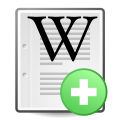Help:Introduction to editing with Wiki Markup/All
This help page is a how-to guide. It details processes or procedures of some aspect(s) of Wikipedia's norms and practices. It is not one of Wikipedia's policies or guidelines, and may reflect varying levels of consensus and vetting. |
Editing pages
A note about editing on mobile devices: Most Wikipedians prefer to edit from a computer, as the editing interface works better there. You can edit from a mobile device, though. See this page for more information.

Wikipedia is formatted using its own language called wiki markup, also called wikitext. It's pretty easy to learn the basics.
You have a choice of using one of two editing tools; the "Source Editor" uses wiki markup.

Alternatively, you can use VisualEditor, a secondary editing interface that works more like a WYSIWYG word processor. VisualEditor is somewhat simpler to use, but Source Editor is more effective for some tasks, and is the only one able to be used on Talk Pages. Elsewhere, you can easily switch between the two editing tools, as shown at right.
To view and edit a page using wiki markup, click Edit or Edit source at the top of any page. This will allow you to type text that you want to add, using wiki markup to format the text and to add other elements like images and tables that are explained later in this tutorial.
Wiki markup can initially seem intimidating (especially references) but it actually requires only a few rules to understand and use. These rules are listed under Help ![]() at the top of the Source Editor, and you'll quickly get used to them! You can always test new techniques in your personal "sandbox" page.
at the top of the Source Editor, and you'll quickly get used to them! You can always test new techniques in your personal "sandbox" page.
Formatting

Most articles actually need very little text formatting.
All formatting is achieved by placing symbols on either side of blocks of text. You can either type the markup manually, or add it through the toolbar at the top of the editing area.
Headings and subheadings can be added by clicking ![]() Advanced then Heading
Advanced then Heading ![]() in the extra toolbar line which now appears.
in the extra toolbar line which now appears.
Selecting "Level 2" will format text as a main heading, the most frequently used subdivision of any page.
"Level 3" gives you a subheading for a Level 2 heading, and so on.
To create a heading without using the toolbar, put text between = signs; the number of = signs on each side of the text indicates the level:
==Heading== (Level 2)
===Subheading=== (Level 3)
Text can be made bold or italic using the B and I buttons on the toolbar.
To create bold or italics without using the toolbar, put text between ' apostrophes; three on each side for bold, or two on each side for italics.
'''bold'''
''italic''
An article's subject is always written in bold the first time it is mentioned, but not thereafter. For detailed guidance on how and where bold and italic text should be used, see the Manual of Style sections on bold and italic formatting.
Links and wikilinks
Wikilinks are one of the key components of Wikipedia. Wikilinks connect pages to each other, tying the whole encyclopedia together.
In general, wikilinks should be added for the first mention of important or unfamiliar concepts in an article.
Typically, wikilinks use square brackets, like this: [[target page]]. You can also insert them by clicking the ![]() icon.
icon.
If you want to link to an article, but display some other text for the link, you can use a pipe | divider (⇧ Shift+\):
[[target page|display text]]

You can also link to a specific section of a page using a hash #:
[[Target page#Target section|display text]]
Here are some examples:
[[link]]displays as link[[Android (operating system)]]displays as Android (operating system), whereas:[[Android (operating system)|Android]]displays as Android[[Earth#Chemical composition|Chemistry of the Earth]]displays as Chemistry of the Earth
You may also encounter templates, which allow frequently used elements to be included on multiple pages. These are designated by curly brackets like: {{template name|parameters}}
For instance, to insert the [citation needed] tag, you can type this code:
{{Citation needed|date=April 2024}}. The ![]() icon works, too.
icon works, too.
Saving your changes
Edit summary (Briefly describe your changes)
![]() This is a minor edit
This is a minor edit ![]() Watch this page
Watch this page
By publishing changes, you agree to the Terms of Use, and you irrevocably agree to release your contribution under the CC BY-SA 4.0 License and the GFDL. You agree that a hyperlink or URL is sufficient attribution under the Creative Commons license.
Cancel
When you think you're ready to publish (save) your changes, there are a few things to do first.
You should preview your changes to check that your edits look as you intended, by clicking the Show preview button. We all make mistakes, so this step can help you catch them before the article is changed.
Write a short edit summary in the "Edit summary" box to help other editors understand what change you have made and why you've made that change. It is okay for your explanation to be quite short. For example, if you are making a spelling correction, you might just put "fix typo".
If you've made a minor change that should be uncontroversial, such as a spelling or grammar correction, you can check the "☑ This is a minor edit" box. Minor edits are those that do not modify the meaning of a page or make a change that another editor might reasonably dispute.
To add a page to your Watchlist, so that you'll be notified of any further changes, use the "☑ Watch this page" box. You can also watchlist pages by clicking the star at upper right (next to the search box on desktop displays).
Previewed the page? Written an edit summary? Then you are ready for the final step: Click the Publish changes button, and your changes will instantly be uploaded to Wikipedia!
Creating new articles

Wikipedia already has 6.8 million articles, so most of the time you'll likely be updating and improving existing pages. Sometimes, however, you may want to create a completely new article! Before you do so, there are three criteria you need to know:
Notability
Is the topic notable? Topics need to be sufficiently important to be included in Wikipedia. This means that the subject must have received significant coverage in reliable sources that are independent of the subject, such as newspapers, magazines, scholarly journal articles, and books.
Reliable sources
Are there reliable and verifiable sources to back up any claims? Before you start writing an article, you should gather a set of independent, reliable, verifiable sources to cite as references. These are essential for ensuring that the contents of Wikipedia remain accurate, verifiable, and trustworthy.
Conflicts of interest
Do you have a conflict of interest (COI)? It is best to avoid writing articles about yourself, your company, or someone you know personally. This is because it is difficult to avoid bias and achieve a neutral point of view on these topics. Even if you cannot write the article yourself, you can always request that someone else write it and provide them with reliable sources to use.
Where to create a new page
It is typically best to create a new article as a Draft (e.g. "Draft:Example"). This allows you to write and develop your article before it gets moved to Wikipedia's mainspace.
|
|
The Article Creation Wizard will walk you through the steps of creating a new draft article and notify experienced editors to review the article and provide feedback. |
See also

